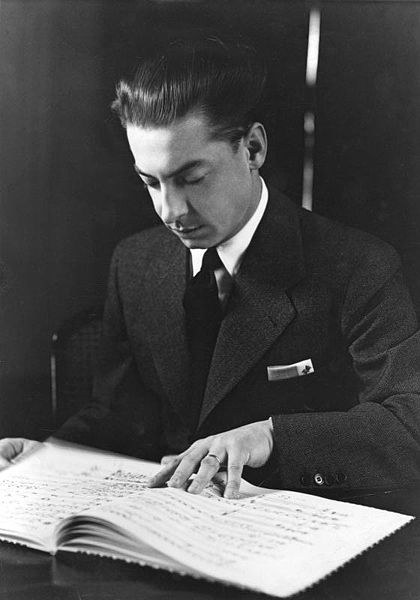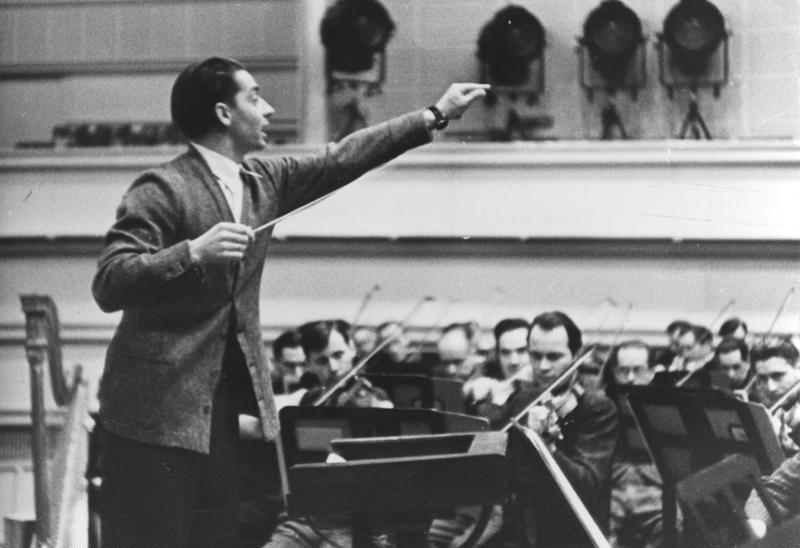<Back to Index>
- Mathematician Vincenzo Viviani, 1622
- Conductor Herbert von Karajan, 1908
- Prince of Bulgaria Alexander Joseph of Battenberg, 1857
PAGE SPONSOR


Herbert von Karajan (5 April 1908 – 16 July 1989) was an Austrian orchestra and opera conductor. His obituary in The New York Times described him as "probably the world's best known conductor and one of the most powerful figures in classical music". He is the top selling classical music recording artist of all time, having sold an estimated 200 million records during his career. Karajan conducted the Berlin Philharmonic orchestra for 35 years.
Herbert von Karajan was the son of an upper middle class Salzburg family. The Karajans are said to have originally been Aromanian, or Greek, from the region of Macedonia. His great-great-grandfather, Geòrgios Johannes Karajànnis, was born in Kozani, a town in the Ottoman province of Rumelia (present West Macedonia in Greece), leaving for Vienna in 1767, and eventually Chemnitz, Saxony. He and his brother participated in the establishment of Saxony's cloth industry, and both were ennobled for their services by Frederick Augustus III on 1 June 1792, thus the prefix "von" to the family name. The surname Karajànnis became Karajan. Herbert's family from the maternal side, through his grandfather who was born in the village of Mojstrana, Duchy of Carniola (today in Slovenia), had Slovene origins according to a modern genealogical research, thus contrasting with or clarifying the traditional view which expressed a Serbian or simply a Slavic origin of his mother.
Karajan was born in Salzburg, Austria - Hungary, as Herbert Ritter von Karajan. He was a child prodigy at the piano. From 1916 to 1926, he studied at the Mozarteum in Salzburg, where he was encouraged to concentrate on conducting by his teacher, who detected his exceptional promise in that regard.
In 1929, he conducted Salome at the Festspielhaus in Salzburg and from 1929 to 1934 Karajan served as first Kapellmeister at the Stadttheater in Ulm. In 1933 Karajan made his conducting debut at the Salzburg Festival with the Walpurgisnacht Scene in Max Reinhardt's production of Faust. It was also in 1933 that von Karajan became a member of the Nazi party, a fact for which he would later be criticised. In Salzburg in 1934, Karajan led the Vienna Philharmonic for the first time, and from 1934 to 1941, he was engaged to conduct operatic and symphony - orchestra concerts at the Theater Aachen.
Karajan's career was given a significant boost in 1935 when he was appointed Germany's youngest Generalmusikdirektor and performed as a guest conductor in Bucharest, Brussels, Stockholm, Amsterdam and Paris. In 1937 Karajan made his debut with the Berlin Philharmonic and the Berlin State Opera, conducting Fidelio. He then enjoyed a major success at the State Opera with Tristan und Isolde. In 1938, his performance there of the opera was hailed by a Berlin critic as Das Wunder Karajan (The Karajan miracle). The critic asserted that Karajan's "success with Wagner's demanding work Tristan und Isolde sets himself alongside Furtwängler and de Sabata, the greatest opera conductors in Germany at the present time". Receiving a contract with Deutsche Grammophon that same year, Karajan made the first of numerous recordings by conducting the Staatskapelle Berlin in the overture to Die Zauberflöte. On 26 July 1938, he married his first wife, operetta singer Elmy Holgerloef. They would divorce in 1942.
On 22 October 1942, at the height of the war, Karajan married his second wife, Anna Maria "Anita" Sauest, born Gütermann. She was the daughter of a well known manufacturer of yarn for sewing machines. Having had a Jewish grandfather, she was considered a Vierteljüdin (one-quarter Jewish woman). By 1944, Karajan was, according to his own account, losing favor with the Nazi leadership; but he still conducted concerts in wartime Berlin on 18 February 1945 and fled Germany with Anita for Milan a short time later. Karajan and Anita divorced in 1958.
In the closing stages of the war, Karajan relocated his family to Italy with the assistance of Victor de Sabata. Karajan was discharged by the Austrian denazification examining board on 18 March 1946, and resumed his conducting career shortly thereafter. In 1946, Karajan gave his first post-war concert in Vienna with the Vienna Philharmonic but he was banned from further conducting activities by the Soviet occupation authorities because of his Nazi party membership. That summer he participated anonymously in the Salzburg Festival. The following year he was allowed to resume conducting.
In 1949, Karajan became artistic director of the Gesellschaft der Musikfreunde, Vienna. He also conducted at La Scala in Milan. His most prominent activity at this time was recording with the newly formed Philharmonia Orchestra in
London, helping to build them into one of the world's finest. Starting
from this year, Karajan began his lifelong attendance at the Lucerne
Festival. In 1951 and 1952 he conducted at the Bayreuth Festspielhaus. In 1955 he was appointed music director for life of the Berlin Philharmonic as successor to Wilhelm Furtwängler. From 1957 to 1964 he was artistic director of the Vienna State Opera. Karajan was closely involved with the Vienna Philharmonic and the Salzburg Festival, where he initiated the Easter Festival, which would remain tied to the Berlin Philharmonic's Music Director after his tenure. On
22 October 1958 he married his third wife, French model Eliette Mouret;
they became parents of two daughters, Isabel and Arabel. He continued to perform, conduct and record prolifically until his death in Anif in 1989, mainly with the Berlin Philharmonic and the Vienna Philharmonic. Karajan played an important role in the development of the original compact disc digital
audio format. He championed this new consumer playback technology, lent
his prestige to it and appeared at the first press conference
announcing the format. The maximum playing time of CD prototypes was
sixty minutes but the final specification enlarged the disc size and
extended the capacity to seventy-four minutes. There are various
stories regarding this, one of which is that this was due to Karajan's
insistence that the format have sufficient capacity to contain
Beethoven's Ninth Symphony on a single disc. Kees Schouhamer Immink, a Philips research engineer directly involved with the invention of the CD, denies the Beethoven connection. In 1980 von Karajan conducted the first recording ever to be commercially released on CD: Richard Strauss's Eine Alpensinfonie (1915), produced by Deutsche Grammophon. Through
the 1980s von Karajan re-recorded many works such as Beethoven's Nine
Symphonies with Deutsche Grammophon's CD booklet introduction saying
that he wanted to preserve his legacy digitally. He also pioneered the Digital Compact Cassette though that format was not particularly successful. His 2007 "Gold" compilation contains the longest known running time disc. Disc two of this collection clocks in at 81:21. Karajan joined the Nazi Party in
Salzburg on 8 April 1933; his membership number was 1,607,525. In June
the Nazi Party was outlawed by the Austrian government. However,
Karajan's membership was valid until 1939. In this year the former
Austrian members were verified by the general office of the Nazi Party.
Karajan's membership was declared invalid but his accession to the
party was retroactively determined to have been on 1 May 1933 in Ulm,
with membership number: 3,430,914. Karajan's
membership of the Nazi Party and increasingly prominent career in
Germany from 1933 to 1945 cast him in an uncomplimentary light after
the war. While Karajan's defenders have argued that he joined the Nazis only to advance his music career, critics such as Jim Svejda have pointed out that other prominent conductors, such as Otto Klemperer, Erich Kleiber and Arturo Toscanini, fled from fascist Europe at the time. British
music critic Richard Osborne counters this thesis by noting that among
the many significant conductors who continued to work in Germany
throughout the war years — Wilhelm Furtwängler, Ernest Ansermet, Carl Schuricht, Karl Böhm, Hans Knappertsbusch, Clemens Krauss and Karl Elmendorff — Karajan was one of the youngest and thus one of the least advanced in his career. There
is widespread agreement that Herbert von Karajan had a special gift for
extracting beautiful sounds from an orchestra. Opinion varies
concerning the greater aesthetic ends to which The Karajan Sound was applied. The American critic Harvey Sachs criticized the Karajan approach as follows: Karajan
seemed to have opted instead for an all-purpose, highly refined,
lacquered, calculatedly voluptuous sound that could be applied, with
the stylistic modifications he deemed appropriate, to Bach and Puccini,
Mozart and Mahler, Beethoven and Wagner, Schumann and Stravinsky ...
many of his performances had a prefabricated, artificial quality that
those of Toscanini, Furtwängler,
and others never had... most of Karajan's records are exaggeratedly
polished, a sort of sonic counterpart to the films and photographs of Leni Riefenstahl. However, it has been argued by commentator Jim Svejda and others that Karajan's pre-1970 manner did not sound polished as it is later alleged to have become. Two reviews from the Penguin Guide to Compact Discs can be quoted to illustrate the point. The same Penguin Guide does nevertheless give the highest compliments to Karajan's recordings of the selfsame Haydn's two oratorios, The Creation and The Seasons. It must also be stated that no less a respected Haydn scholar than H.C. Robbins Landon wrote
the notes for Karajan's recordings of Haydn's 12 London Symphonies and
states clearly that Karajan's recordings are among the finest he knows. Regarding twentieth century music, Karajan had a strong preference for conducting and recording pre-1945 works (Mahler, Schoenberg, Berg, Webern, Bartók, Sibelius, Richard Strauss, Puccini, Ildebrando Pizzetti, Arthur Honegger, Prokofiev, Debussy, Ravel, Paul Hindemith, Carl Nielsen and Stravinsky), but also did record Shostakovich's Symphony No. 10 (1953) twice and did premiere Carl Orff's "De Temporum Fine Comoedia" in 1973.
Karajan
was the recipient of multiple honours and awards. On 21 June 1978 he
received the Honorary Degree of Doctor of Music from Oxford University. He was honored by the "Médaille de Vermeil" in Paris, the Gold Medal of the Royal Philharmonic Society in London, the Olympia Award of the Onassis Foundation in Athens and the UNESCO International Music Prize. He received two Gramophone Awards for recordings of Mahler's Ninth Symphony and the complete Parsifal recordings in 1981. In 2002, the Herbert von Karajan Music Prize was founded in his honour; in 2003 Anne-Sophie Mutter who had made her debut with Karajan in 1977, became the first recipient of this award.